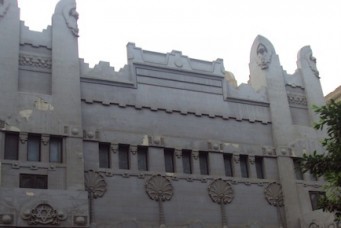A Director’s Clash
The film Eshtebak causes an uproar in Egypt.
The reception to the film Eshtebak (“Clash”) could not have been further apart within Egypt and abroad. When the film was selected to premiere at a sidebar screening for the 2016 Cannes Film Festival, it won instant critical acclaim. It was later submitted to the Best Foreign Language Film category of the 89th Academy Awards but failed to earn a nomination. Back at home, the backlash was severe, causing the film’s commercial release to be delayed and its director to be publicly accused of being a traitor on national television. Ultimately, the strong reaction caused by the film mirrored Egypt’s fraught political climate.
Eshtebak—screened at the American University in Cairo (AUC) in the spring—delivers a hyper-realistic and gritty portrayal of the social divisions following the deposal of then-President Mohammed Morsi. The camera does not leave the confines of the eight-meter-square police truck, which quickly fills to capacity. From the mix of detained protestors found inside this single-moving stage, the main tension develops between Muslim Brotherhood and pro-army supporters.
The film captures this politically divisive and polarized time in Egyptian history when revolutionary sentiment following the 2011 uprising had dissipated into a contested political game between the military leadership and the Muslim Brotherhood. Despite all the controversy it caused, “this film is actually about coexistence and anti-hysteria,” explained director Mohamed Diab, who also directed 678, a hit feature film about sexual harassment in Egypt. Diab delivers a powerful critique of polarization and hate through the film’s depiction of a society riven by political disagreement in post-revolutionary Egypt. Although the film never stakes out a specific political position, the narrative implies a potential for an alternate reality in Egypt. “My job is to dream,” he added, “We, as filmmakers, are not politicians. We need to preach the idealistic approach.”
The film, however, drew overwhelming reactions from pro- and anti-government groups within Egypt. “The way the [viewers] reacted was a self-fulfilling prophecy,” Moez Masoud, one of the film’s producers present at the screening, said. “We lived through a time when we had one hegemonic narrative, and after 2011, we have two hegemonic narratives.”
During production, the crew encountered numerous hurdles, including financiers pulling their funding and difficulties passing the censorship board. Some even risked their personal safety and reputation—Masoud, for instance, was deemed a traitor in the media by both sides of the political spectrum, of which he quipped: “I couldn’t be a traitor to both sides at the same time, it is just logically impossible, yet there it was.”
The film’s heavy emphasis on the fractures within Egyptian society makes the fleeting moments of humanity more profound. The budding love interest between a young teenage nationalist and a veiled Muslim Brotherhood supporter points to a shared human bond. Singing well-known songs, debating Egyptian soccer, and sharing memories of the revolution exemplify collective social cohesion.
Diab, who co-wrote the script with his brother Khaled, originally ended the film by crashing the truck into the Nile River, causing all of the characters to drown. Instead, a more ambiguous ending thrusts the characters into the mercy of a mob of protestors that tries to aggressively enter the truck. The audience is left uncertain of the characters’ ultimate fate. “I think people are going to learn to live together when they realize that they are all in that car together,” Diab said. “And if we go to the wrong direction, we are all going to drown together, or we’re all going to survive together.”


